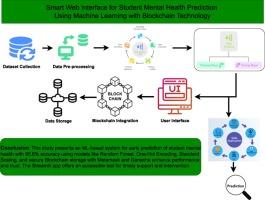Smart web interface for student mental health prediction using machine learning with blockchain technology
引用次数: 0
Abstract
Student mental health is becoming a growing global concern, with more students facing psychological stress, anxiety, and related disorders. These mental health challenges often develop gradually and, if ignored, can negatively affect a student's academic performance and personal life. Early detection is essential, but high costs, limited resources, and time constraints often hinder it. The study proposes a machine learning-based approach to predict and assess student mental health, addressing this problem. Using rich psychological and behavioral data, the system can identify early signs of mental distress. An extensive evaluation of 12 machine learning models identified the top six performers. Logistic regression, Decision Tree, Extra Tree, Adaboost, Gradient Boosting, and XGBoost. Among these, the fine-tuned Random Forest algorithm achieved the highest performance, with an impressive accuracy of 95.6%. To ensure practical implementation, a Streamlit-based application was developed. This application enables educators and mental health professionals to perform real-time analysis and receive predictions in a clear and user-friendly format. The study incorporates blockchain technology to ensure the secure handling of sensitive data. Data collected through the Web interface, such as responses to mental health questionnaires, is securely stored using blockchain technology. This integrated system offers a reliable and scalable solution for monitoring and supporting student mental health.

使用区块链技术的机器学习进行学生心理健康预测的智能网络界面
随着越来越多的学生面临心理压力、焦虑和相关障碍,学生心理健康正在成为一个日益受到全球关注的问题。这些心理健康挑战往往是逐渐发展的,如果忽视,可能会对学生的学习成绩和个人生活产生负面影响。早期检测至关重要,但高昂的成本、有限的资源和时间限制往往会阻碍检测。该研究提出了一种基于机器学习的方法来预测和评估学生的心理健康,以解决这一问题。利用丰富的心理和行为数据,该系统可以识别出精神困扰的早期迹象。对12个机器学习模型的广泛评估确定了表现最好的6个模型。逻辑回归,决策树,额外树,Adaboost,梯度增强和XGBoost。其中,经过微调的Random Forest算法取得了最高的性能,准确率达到了惊人的95.6%。为了确保实际实现,开发了一个基于streamlite的应用程序。该应用程序使教育工作者和心理健康专业人员能够以清晰和用户友好的格式进行实时分析和接收预测。该研究采用区块链技术来确保敏感数据的安全处理。通过Web界面收集的数据,如对心理健康问卷的回答,使用区块链技术安全地存储。这个综合系统为监测和支持学生的心理健康提供了可靠和可扩展的解决方案。
本文章由计算机程序翻译,如有差异,请以英文原文为准。
求助全文
约1分钟内获得全文
求助全文
来源期刊

Neuroscience informatics
Surgery, Radiology and Imaging, Information Systems, Neurology, Artificial Intelligence, Computer Science Applications, Signal Processing, Critical Care and Intensive Care Medicine, Health Informatics, Clinical Neurology, Pathology and Medical Technology
自引率
0.00%
发文量
0
审稿时长
57 days
 求助内容:
求助内容: 应助结果提醒方式:
应助结果提醒方式:


